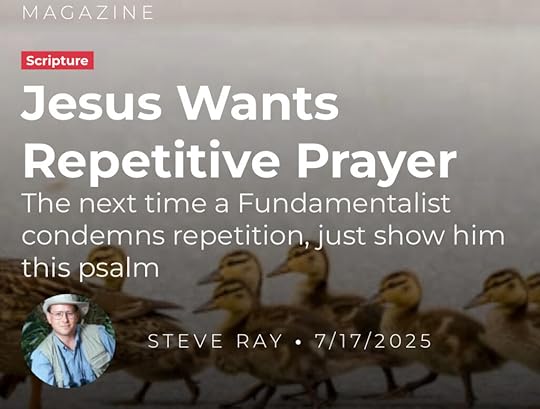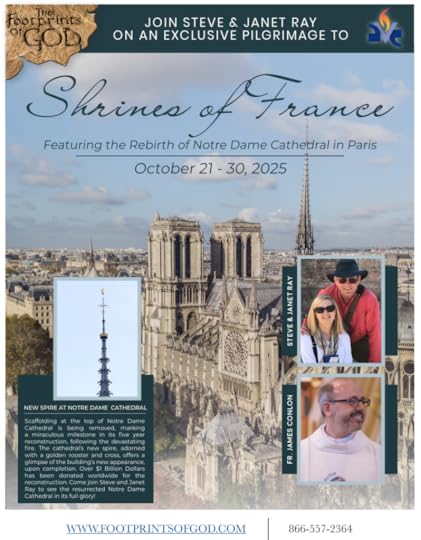Stephen K. Ray's Blog, page 5
July 25, 2025
Questions I Answered on Catholic Answers Live – “Ask Me Anything” – Wide Range of Interesting Questions
My segment of Catholic Answers Live starts at 10:45 minutes into the show- due to technical difficulties….
https://dts.podtrac.com/redirect.mp3/cdn.catholic.com/wp-content/uploads/ca250723a-2.mp3“Am I Catholic Without Catechesis?” This episode explores the nuances of faith and practice, addressing questions like the implications of baptism and confirmation without catechesis, responses to Seventh Day Adventist beliefs about death, and the role of Catholic schools in adhering to Church teachings. Tune in for a thoughtful examination of these important topics.
Questions Covered:
11:54 – Am I catholic if I was Baptized and confirmed, but I wasn’t Catechized or practice?20:59 – What is a good response to the Seventh Day Adventist idea of a sleep death?29:04 – At the time of Judgement, do we bypass heaven if we receive the apostolic pardon?33:49 – Do Catholic schools need to abide by the Catholic church for curriculum?45:05 – Why did you discount the Second Judgement in your answers for Seventh Day Adventist?49:55 – How can I navigate converting to Catholicism when family isn’t supportive?My segment starts at 1:45 minutes in.
The post Questions I Answered on Catholic Answers Live – “Ask Me Anything” – Wide Range of Interesting Questions appeared first on Defenders of the Catholic Faith.
July 23, 2025
How does lacking an “i” deny that Jesus is God?
Today I received an e-mail asking about the divinity of Christ — and a word without the “i”, or in Greek, an “iota”. One may quip, “That doesn’t make an iota of difference!”
But it DOES!
Tom wrote:
I heard you with Teresa Tomeo this morning. You gave an explanation of removing the letter iota from a particular word changed the meaning of it. I think that it was in the context of meaning “like God” or “is God” .
I was wondering if you could provide that explanation again, so I can gain a better understanding.
Tom, you ask a very good question. It is such a good question that it consumed the early Church for the first four centuries, and wars were fought over it, and creeds were written about it, and we still recite those creeds today.
The council that defined this definitively was the Council of Nicea in AD 325, exactly 1700 years ago, we are celebrating that anniversary this year.
To your point:
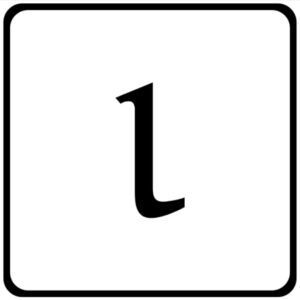 Is Jesus a created being or is he the eternal Son of God without a beginning and of the same substance as God the Father?
Is Jesus a created being or is he the eternal Son of God without a beginning and of the same substance as God the Father?
In AD 325, the Council of Nicea said Jesus was not created, nor did he have a beginning. He is eternally begotten of the Father and the same substance as the Father and the Holy Spirit. There is one God, but three Persons who make up that godhead. There was never a time when he was not God the Son.
A priest named Arius started a heretical movement known as Arianism. He stated that God created Jesus and he was not of the same substance or nature as God the Father.
There is an important technical Greek word that can be written with or without an iota (i) which made all the difference in the definition defined by the Church. The iota is the Greek vowel for “I”.
Here are the two words: one with the i included, the other with the i excluded. That small iota gives two words very different meanings.
Homoousios = same substance as the Father
Homoiousios = not of the same substance, a similar but different substance
NOTICE: the Greek letter “i” (iota) is the only difference. That is why in popular language today someone may say, “It doesn’t make one iota of difference.” Many people say it but have NO IDEA what it means or where it came from.
It makes a huge, profound difference! Without the iota it means “of the same divine substance or nature” — Jesus is God! With the iota it means “of a different substance” — Jesus is NOT God
It is a very small letter worth fighting over!
Also, see the Catechism, par. 465.
The post How does lacking an “i” deny that Jesus is God? appeared first on Defenders of the Catholic Faith.
July 22, 2025
Did you know the Moon has it’s own Bishop?
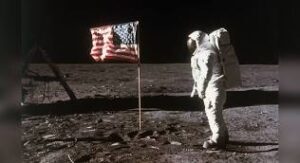 Yup, the bishop of Orlando Florida is the bishop of the moon. A diocese of 14.5 million square miles?
Yup, the bishop of Orlando Florida is the bishop of the moon. A diocese of 14.5 million square miles?
An old law of the Church states that “any newly discovered territory would fall under the bishopric from whence the discovering expedition departed.
“Since Cape Canaveral was the liftoff point for Apollo 11, it was under the purview of the Diocese of Orlando’s Bishop Borders (at the time) who was then theoretically the first bishop of the moon.
You can read the article on Aleteia.
The post Did you know the Moon has it’s own Bishop? appeared first on Defenders of the Catholic Faith.
July 19, 2025
The Bible Teaches Us to Pray Repetitive Prayers
As a former Baptist, we accused Catholics of praying with “vain repetition” based on a poor translation of the Greek text for Matthew 6:7.
In actuality, that does not mean repetition and I wrote an article to explain how the Bible actually teaches us to pray with repetitive prayers.
I use heaven, Jesus, the Temple and the Psalms, the parables, the Our Father and the Early Church. I hope you enjoy the article I wrote for Catholic Answers Magazine — and below is my show on this topic with Teresa Tomeo.
The post The Bible Teaches Us to Pray Repetitive Prayers appeared first on Defenders of the Catholic Faith.
July 18, 2025
Excitement over Newly-renovated Notre Dame Cathedral in Paris – JOIN US!
July 14, 2025 Catholic News Agency
An interesting article about the excitement over the newly opened Cathedral of Notre Dame in Paris. We will be celebrating Mass here this October. Maybe you can join us? We still have some seats open.
Also a day in Normandy France to celebrate the 80th anniversary of our heroic soldiers and the victory of D-Day. We will have Mass at the relics of Thérèse of Lisieux on the 100th anniversary of her canonization—and much more. See our brochure and web link below.
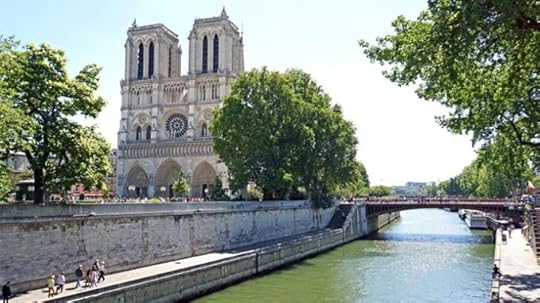 Notre-Dame de Paris (French for “Our Lady of Paris”), also known as Notre-Dame Cathedral or simply Notre-Dame, is among the largest and most well-known church buildings in the world. (Credit: Sam valadi, CC BY 2.0, via Wikimedia Commons)ACI Prensa Staff, Jul 14, 2025 / 18:10 pm (CNA).
Notre-Dame de Paris (French for “Our Lady of Paris”), also known as Notre-Dame Cathedral or simply Notre-Dame, is among the largest and most well-known church buildings in the world. (Credit: Sam valadi, CC BY 2.0, via Wikimedia Commons)ACI Prensa Staff, Jul 14, 2025 / 18:10 pm (CNA).Notre-Dame Cathedral in Paris has become the most visited place in France. Since reopening its doors last December after a 2019 fire, it has welcomed more than 6 million people.
On April 15, 2019, the French capital witnessed one of the most devastating tragedies in its recent history. Its iconic cathedral — a religious, architectural, and cultural symbol that had withstood the test of centuries — was engulfed in flames.
The fire left in its wake incalculable losses, including the emblematic spire located above the transept of the church. However, the high altar was undamaged and all the works of art housed in the church, including the relic of the Crown of Thorns, were rescued and brought to a safe place.
Five years later, on Dec. 7, 2024, the cathedral doors were once again opened wide, marking a new beginning for the restored church. On that occasion, Pope Francis referred to Notre-Dame Cathedral as “a masterpiece of Christian faith and architecture,” stating that with its reopening, “sadness and mourning” gave way to joy.
Since its reopening, the influx of faithful and pilgrims to the cathedral has continued. Just one month later, the church had already received 800,000 visitors, equivalent to nearly 29,000 people per day.
The number has continued to grow. According to a recent report, the total number of visitors exceeded 6 million as of June 30, with a daily average of approximately 35,000.
The French newspaper La Tribune Dimanche reported that, in the six months since its reopening, 6.015 million people have passed through its doors.
As a result, Notre-Dame has become the most visited place in France, the cathedral’s rector, Monsignor Olivier Ribadeau Dumas, told the newspaper. The French priest also highlighted that, each month, visits average 1,000 more than the previous month.
Taking into account these numbers represent only a half a year, they are on track to exceed the 8.7 million visitors to the famous Louvre Museum all last year, the 8.7 million recorded at Versailles, and the 6.3 million people who went up the iconic Eiffel Tower.
The post Excitement over Newly-renovated Notre Dame Cathedral in Paris – JOIN US! appeared first on Defenders of the Catholic Faith.
July 13, 2025
I Say to Janet, “Look what we got started!” – Updated family picture for grandson Dominic’s wedding
To say I am proud of this gang would be an understatement. Janet and I are filled with gratitude, love, and appreciation — and praise to our wonderful Lord Jesus, who made all this possible and gave us such a beautiful family.
Dominic Brown, our 22-year-old grandson, married a beautiful and godly girl named Anna after graduating from Wyoming Catholic University. For the wedding reception, he slaughtered his own hogs and brewed his own beer to feed 350 people. Couldn’t be prouder of this boy.
Below is a picture after the wedding and a short, 7-minute video of the wedding and the rousing reception afterwards.
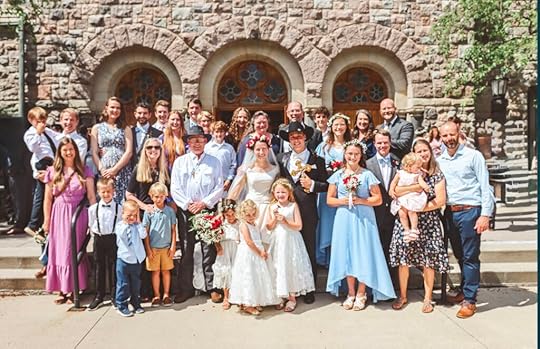
The post I Say to Janet, “Look what we got started!” – Updated family picture for grandson Dominic’s wedding appeared first on Defenders of the Catholic Faith.
July 12, 2025
What does the word PILGRIM mean?
What does the word “pilgrim” mean?
Each November, we celebrate Thanksgiving to commemorate the Pilgrims who left England to establish a colony in the New World. We call them pilgrims because they left their homes and journeyed into the unknown.
The word “pilgrim” means a wayfarer, a traveler, one who journeys especially to a foreign place. Its origin is from the Latin word peregrinus, meaning “foreign, alien, coming from abroad, traveling.”
It soon took deep roots in Christian tradition, especially describing Christians traveling to the Holy Land seeking God, especially to visit the land of the Bible and of Our Lord. St. Augustine used the term “peregrinatio” to describe a Christian’s spiritual exile in search of divine truth.
The earliest recorded Christian pilgrimage to the Holy Land was by the anonymous Pilgrim of Bordeaux in 333 AD. He recounts his spiritual journey through the sacred sites.
By the 4th century, pilgrimage was actively encouraged by figures such as St. Jerome and St. Helena, the mother of Constantine the Great. Pilgrimages were grueling in those days, and they never knew if they would return home. St. Francis of Assisi took his pilgrimage in 1219, and his followers eventually became the protectors of the holy sites.
But Christians did not “invent” pilgrimages. The Israelites would go on pilgrimages to Jerusalem every year to celebrate the high and holy feasts at the Temple. Psalm 84 describes their longing for the Lord’s precincts as they journeyed (my article on Psalm 84). Psalms 120-134 are known as the “Psalms of Ascent” or the “Pilgrimage Psalms,” as they were sung by those who climbed the mountain to experience God’s presence in Jerusalem.
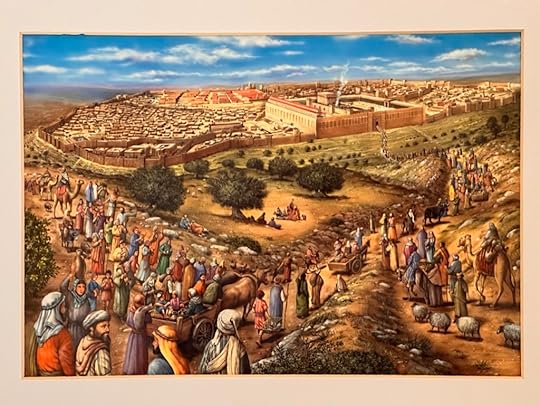
Psalm 122 begins, “I was glad when they said to me, ‘Let us go to the house of the LORD!’ Our feet have been standing within your gates, O Jerusalem!”
Mary, Jesus, and the Israelites of old chanted these Psalms as they journeyed on their yearly pilgrimage, much like we do today.
Janet and I first followed untold millions of pilgrims to the Holy Land in 1995 after our conversion to the Catholic Church. Soon, we had an irrepressible urge to visit the land of the Bible for ourselves. I cried the whole way through our first pilgrimage. Subsequent trips inspired us to share our discoveries and joy with others.
In 2005, we took our first full bus of pilgrims landing in Tel Aviv (the biblical Lydda, Acts 9:36-43). Since then, we have visited the Land over 200 times and have led over 150 pilgrimage groups. Well over 10,000 people have joined us.
We invite you to join us on one of our upcoming pilgrimages to seek God and experience the numerous graces that come from visiting these holy sites.
The post What does the word PILGRIM mean? appeared first on Defenders of the Catholic Faith.
July 9, 2025
Steve and Janet featured on “Sinners & Saints” first one-hour special
Janet and I were recently interviewed by Timothy Jeffries on his show “Sinners & Saints”. It was filmed in the studios where we produced our Footprints of God film series, No. 10.
We hope you enjoy the fast-paced, fun, and informative interview, which brings glory to our Lord Jesus and makes one proud to be Catholic!
The post Steve and Janet featured on “Sinners & Saints” first one-hour special appeared first on Defenders of the Catholic Faith.
July 6, 2025
Saints & Shrines of France – including D-Day and Mass at Notre Dame Cathedral!
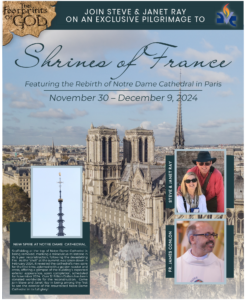 The first time we did this pilgrimage through France it was a huge success and a very blessed time. This trip will be even better! Join us November 30 – December 9, 2024.
The first time we did this pilgrimage through France it was a huge success and a very blessed time. This trip will be even better! Join us November 30 – December 9, 2024.
D-Day, also known as the Normandy Invasion
This turning point in World War II occurred on June 6, 1944 — eighty years ago. We will celebrate that crucial battle in Normandy France and walk on Omaha Beach. On that day, more than 156,000 American, British, and Canadian troops stormed the fiercely defended beaches of Normandy in northern France. This operation marked a critical turning point in World War II.
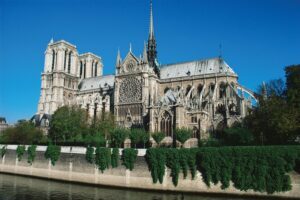 Notre Dame Cathedral in Paris
Notre Dame Cathedral in Paris
This iconic church was severely damaged by fire in 2019. After 5 years of of restoration, Notre Dame is scheduled to open on December 8 AND WE WILL BE THERE! We are hoping to have Mass in the Cathedral the day it opens.
To top all of that, we will also visit Lisieux, home of St. Therese and celebrate Mass where her family did. Mont-Saint-Michel is stunning beyond belief as we spend time exploring and visiting the village.
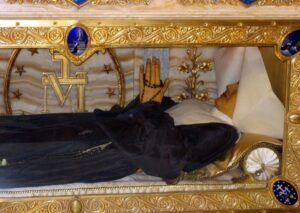 We will visit the Cathedral of Saint Vincent and later that day celebrate Mass in Pontmain where the Virgin Mary appeared to four children in 1871.
We will visit the Cathedral of Saint Vincent and later that day celebrate Mass in Pontmain where the Virgin Mary appeared to four children in 1871.
Paris and the Seine River cruise. Chartres, Notre Dame Cathedral, St. Catherine Labouré’ incorrupt body and the Miraculous Medal.
Just a few blocks away, another incorrupt body of St. Vincent de Paul. See the Basilica of Sacre-Couer in Montmartre, where perpetual adoration of the Blessed Sacrament has continued uninterrupted since 1885.
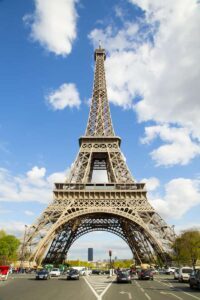
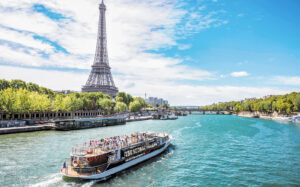 And so much more. For the interactive map, itinerary, brochure and more info — and to register on-line visit here.
And so much more. For the interactive map, itinerary, brochure and more info — and to register on-line visit here.
You will also receive a 2-hour movie of your pilgrimage as a keepsake. Here is the video we produced for our pilgrims on our last pilgrimage through France.
The post Saints & Shrines of France – including D-Day and Mass at Notre Dame Cathedral! appeared first on Defenders of the Catholic Faith.
July 5, 2025
Questions I Answered on Catholic Answers Live – Q & A for Non-Catholics
Listen here:
https://catholicconvert.com/wp-content/uploads/2025/07/ca250702a.mp3In this episode of Catholic Answers Live, we tackle a wide range of thoughtful questions from callers of various religious backgrounds. Topics include the similarities and differences between Catholicism and Latter-day Saint beliefs, a clear explanation of purgatory, and why only the priest consumes the Precious Blood during Mass.
We also discuss whether purgatory is purification or punishment, the role of baptism in Christian unity, and the theological significance of the 1,000 years after Armageddon. Additional questions explore the Catholic view on salvation versus universalism, the Greek wording in Scripture regarding Jesus’ “brothers,” and how to make sense of the brokenness in the world today—especially in children.
Questions Covered:
04:47 – Are there any similarities between Latter-day Saint (LDS) and Catholic beliefs?08:20 – What is a simple explanation of purgatory for someone unfamiliar with Catholic teaching?16:36 – Why is it only the priest who consumes the wine during Mass?22:20 – Is purgatory meant to be purification or punishment?25:13 – If baptism is the great unifying sacrament among Christians, why doesn’t it allow all baptized Christians to receive Communion?31:41 – What is the meaning and significance of the 1,000 years after Armageddon, and how does it compare with the concept of purgatory?35:29 – How does the Catholic view of salvation differ from Christian universalism?43:37 – What does the Greek in Scripture indicate about Jesus’ brothers and whether Mary was their mother?50:43 – Why does so much brokenness exist in the world, especially as seen in children?The post Questions I Answered on Catholic Answers Live – Q & A for Non-Catholics appeared first on Defenders of the Catholic Faith.
Stephen K. Ray's Blog
- Stephen K. Ray's profile
- 27 followers


